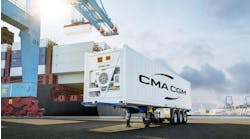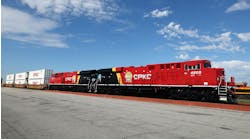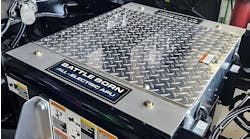One of the most critical issues facing the United States trucking industry is a major shortage of qualified drivers, said 77% of the industry leaders polled by e-mail and at the recent Bi-Annual Fleet Managers’ Conference attended by senior fleet operations managers for Fortune 500-level companies.
Conference sponsor First Fleet Corp released the results of the survey it commissioned on trucking industry concerns.
Not far behind their concerns about drivers were the impact of skyrocketing fuel prices and the cost of maintenance, coupled with the struggle to find ways to reduce diesel consumption. Sixty-one percent of those surveyed said they were adjusting vehicle specifications to address and lower fuel consumption, while 59% said they had made utilization adjustments for fuel efficiency by increasing the load on each truck. Some respondents mentioned the use of onboard telematic tracking/monitoring devices to help develop specific driving pattern improvements to decrease fuel consumption.
Ninety-three percent of the trucking executives surveyed said they would replace nearly 25% of their fleet within the next year, while 72% plan to replace half of their fleet in two or more years. New emission standards taking effect in 2007 appear to play a role in the decisionmaking cycle, with most respondents saying that they plan to replace an average of 38% of their fleet before the new tougher regulations kick in.
Telematics is a hot topic among truck fleet managers, with exactly 50% of all survey participants reporting that their companies are using some kind of logistics or wireless communications device on board their trucks to increase productivity. An additional 37% of those surveyed also plan to install these boxes within a year. While these devices were originally intended for truck location and/or recovery of stolen property, only 13% reported using telematics for this purpose. The majority (81%) use the systems to monitor driving patterns and equipment specifications in order to develop fuel-saving, equipment maintenance, and specification strategies.
Homeland security issues drew a 53% response of those polled, who felt confident the security measures instituted by the trucking industry since 9/11 have succeeded in making Americans feel safer. Another security matter addressed was the newly required Federal Motor Carrier Safety Administration portable driver history and more in-depth background screening of drivers. Seventy-seven percent said they were already doing extensive background screening, and 43% said the new regulations simplify hiring of qualified drivers.
As for steps their companies are taking to offset some of the fuel problems the industry has encountered, their responses included: “Consolidating fuel purchases via national programs through our corporate parent [has helped],” “Studying a shutoff valve after idling 75 minutes,” and “Driver training to increase fuel economy.”


